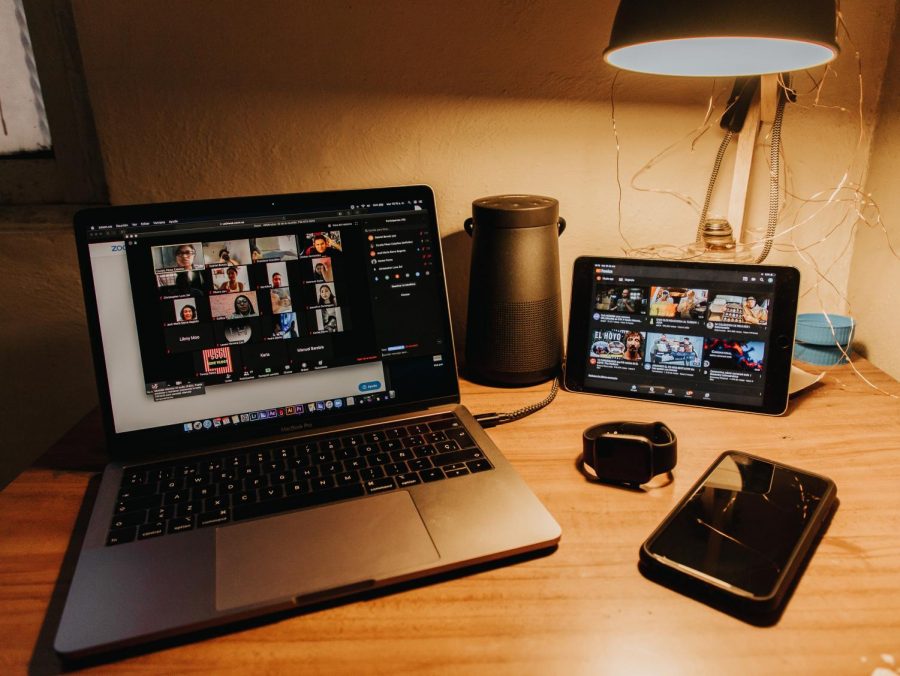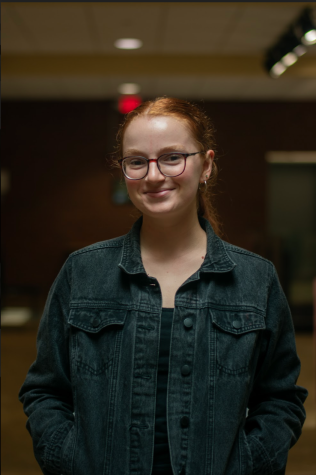Students, faculty experience Zoom burnout
November 6, 2020
For better or worse, Zoom is the new lecture hall.
It has exploded in popularity since the beginning of the COVID-19 pandemic. The online video conference platform and other similar programs have been used to deliver courses virtually at major universities across the world.
How are Chatham students and faculty adapting? In what ways has the dramatic increase in screen time affected the health and wellbeing of both groups?
“There’s a reason why you don’t look in the mirror for eight hours a day,” said Ava Roberts ‘22 about Zoom instruction.
Roberts has experienced “Zoom burnout” in more ways than one. She understands the magnitude of current affairs and does not believe that in-person instruction is safe at the moment, but that being said, she finds it hard to focus in classes conducted virtually.
“When everyone of your classmates is on your screen, plus whatever is happening in their backgrounds, plus your own image is staring back at you, it can take an enormous amount of energy to not get distracted,” Roberts said.
Olivia Zelinsky ‘24 feels set back in her engagement in class. She’s not alone in admitting to having fallen asleep while in Zoom calls before.
For her, Zoom makes it hard to participate in class.
“I want to show my professors that I’m interested and that I’m prepared, but it’s hard to do that over Zoom,” she said. It’s difficult to find an opportunity to chime in and create group discussions like those that would otherwise arise naturally during in-person class settings, she added.
The overwhelming feeling among students is that Zoom acts as a divide between themselves, their peers and their professors. Both Roberts and Zelinsky said their grades have not been impacted, but their levels of engagement and feeling connected to the Chatham community this year have been.
The obstacles created by online instruction are something professors must deal with, too. Adjunct professor Deborah Hosking misses the free hours of her day spent talking to her students, the maintenance staff and fellow faculty members on a more personal level.
“We have such a good group in the [Art & Design Center],” Hosking said. Keeping in contact with her coworkers and with students through email correspondence has taken significant energy — far more than popping into offices or classrooms.
Hosking estimates an average of 40 hours per week is spent in front of her computer. That time consists of troubleshooting organizational issues in Brightspace (Chatham’s new learning management system), preparing lesson demonstrations, staying on top of Adobe updates, giving instruction over Zoom and her other responsibilities.
“Zoom is most definitely not a place for spontaneity,” Hosking said when reflecting on how much work goes into keeping a virtual class moving. At the end of the day, she, like many others these days, feels like she’s left with her head and eyes swirling.
Despite the literal and figurative headaches she encounters, Hosking has found inventive ways of making the most of online instruction. In her media literacy course, students were prompted to create “Zoom sets” in order to get them thinking about framing themselves during video lectures. Here, Hosking asked her students to consider the falsifying nature of film sets and social media.
Scott Kalafatis, Ph.D, an assistant professor of sustainability, has experienced similar challenges with Zoom. He reports spending about 10 hours a day on the computer, and 10 to 15 hours a week on Zoom.
Kalafatis has used this as an opportunity to explore the possibilities of virtual instruction. He has found it helpful to allow students to guide some of the components of his classes by observing where they seem most interested.
He said that one of the most pleasantly surprising things to come out of online learning has been the discussions that take place in the Zoom chat during his sustainability and society course. He loves seeing students really engage with the course material by talking to each other in a mature and constructive way, he said.
Kalafatis knows that the social aspects of college are largely absent this year, and he hopes that giving students space to interact in his classes will make up for at least a small part of this loss.
On a more personal note, Kalafatis also uses Zoom to acclimate to his teaching position and further develop his skills as an instructor. Zoom has helped him with his anxiety around public speaking, he said, by serving as the facade that he might otherwise put up himself. He aims to be the kind of professor that leaves students with a memorable impression — preferably an endearingly awkward one, he admitted.
As someone with an interest in social science, Kalafatis finds the traditional academic setting funny and in many ways, seeks to break it down. During this time, he has enjoyed seeing pets or other household members walking around in the background of students’ videos — an occurrence subversive to the “professionalism” often promoted by academics.
“I am amused by humanness,” Kalafatis said. He hopes that as we cope with online learning, we can all be human with one another.
The meaningful efforts of professors like Kalafatis have not gone unnoticed by students.
“Scott is the definition of the type of professor that makes you feel like a human being,” Roberts said. “He makes us feel welcome and comfortable, and he makes his content digestible for students.”
Students and faculty alike experience the burnout in this age of online learning. Both groups long for friends, for blue light detoxes, for houses with outdoor spaces, for art, for coming together in groups.
Many days the feeling of “what can’t be,” as Roberts puts it, takes over. But when exhaustion hits hard, we must remember each other.
Zelinsky and Roberts are both impressed by the adaptability and creativity of their professors.
“Keep going. We know it’s hard. We admire you,” Roberts said. Both students also offered moving words of support and encouragement to their classmates.
“To my fellow instructors, I miss you. To my students, I look forward to more time spent in person,” Hosking said.
“I just hope SUS102 can be fun again,” Kalafatis said with a laugh.









Sophie Woodrow • Nov 14, 2020 at 9:00 pm
As a fellow student, I definitely feel the struggles of Zoom University and really appreciate all the work that everyone is putting in to make the best of it!